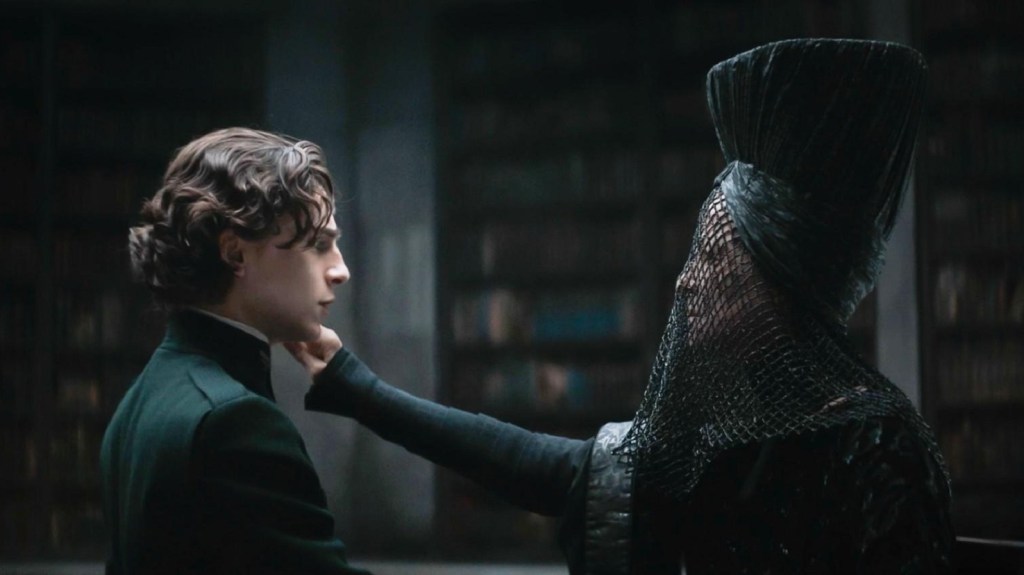Our plans are measured in centuries.
Reverend Mother Mohiam
And that’s how Denis Villeneuve‘s Dune (2021) felt.
If it had been an eight minute short, with the electrical Charlotte Rampling, as Reverend Mother Mohiam – in full goth regalia, in a darkened library, on a distant planet, pain-testing the blank slate that is Timothée Chalamet, as Paul Atreides, to gauge his capacity for impulse-control, and the suitability for the job of a Messiah – I would have given it a five-star, no questions asked.
However, as things stand, the third screen adaptation of the 1965 novel by Frank Herbert – the first famously being by David Lynch’s (1984), the second a miniseries (2000) – is well over two hours long, and feels more like an obscure, scattered conversation overheard on a long train ride, peaking early with Rampling’s natural mystique, and then hitting a downward spiral – all dense plot and mild tedium, a bounty of sensual imagery wasted on zero substance.
Its casting is a downer of sorts, too. Along with the choppy script by Jon Spaihts, Eric Roth, and Villeneuve, himself, the choice of actors is the film’s key mishap – predictably stretching from epic old-school to random indie, the weight of a performance as if measured in marketing-approved screen time.
Unlike the supremely confident Rampling, Stellan Skarsgård as arch-villain Baron (Vladimir!) Harkonnen and the brooding Javier Bardem as the earthy Fremen, Stilgar, had little manoeuvring space to flex their very significant acting chops. However, the hollow centre of the narrative doughnut firmly belongs to the permanently poker-faced Oscar Isaac, as Duke Leto Atreides, and the above-tagged Chalamet, as his son Paul – bearing both the burden of being the chosen one and carrying what was to be a thinking-man’s blockbuster without an essential element for this particular endeavour: action-hero bravado. A casting choice I could not explain in any other way than the fact that Chalamet seems a popular pick for big budget leads in recent years, and was pretty good in some of them.
Rebecca Ferguson as the sorceress mother of Paul, Lady Jessica Atreides, of the order of Bene Gesserit, almost bridges the gap between the two thespian universes, simply by sheer determination to do her best for the story, and perhaps could have offered so much more were she not annoyingly framed as Terminator 2‘s (1991) Sarah Connor, thus her entire performance seemed to me a déjà vu.
In a nutshell, nothing and no-one within Dune made me care even a tiny bit about a single royal from the noble House Atreides, lament the fate of the gorgeous yet deadly desert planet Arrakis, or even pay attention to the term spice, let alone remember why it is so valuable to everyone – which is why this incredibly sophisticated enterprise failed in a key mission of any quality storytelling, and therefore, a piece of cinema, at least with this one viewer – and that is some measure of emotional investment in a narrative.
Which finally lands the buck squarely at the director’s feet.
★★☆☆☆
Author: ©Milana Vujkov

6 responses to “Dune”
I felt the same! You hit it right on the money…
🙏
Correctimundo 🙂
🙏😊
Indeed…Dune blows and as another critic mentioned “Hans Zimmer Must Be Stopped!” Overwrought, boring, cliched score by a talented film composer.
Haters are going to hate. As a Dune fan who read the book as a teenager, this version of the saga was Epic. As I said, haters are always going to hate. Readers, this film was magical and if you want a magical experiential viewing, see it in a theater with D Box motion seats.